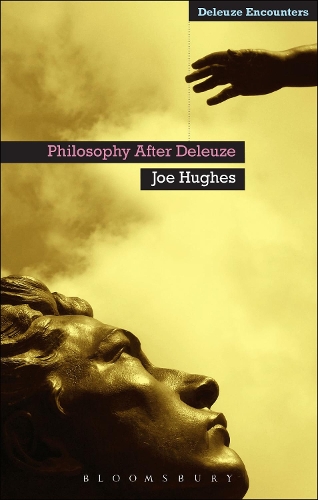
Philosophy After Deleuze
(Paperback)
Publishing Details
Philosophy After Deleuze
By (Author) Dr Joe Hughes
Bloomsbury Publishing PLC
Bloomsbury Academic USA
11th October 2012
United States
Classifications
Tertiary Education
Non Fiction
194
Physical Properties
Paperback
192
Width 138mm, Height 214mm, Spine 14mm
260g
Description
Philosophy After Deleuze provides a concise and accessible introduction to Deleuze in relation to philosophical inquiry. The book shows how Deleuze's work contributes to contemporary debates in each of the major areas of philosophy: metaphysics, ethics, aesthetics, and political philosophy. Hughes begins by examining Deleuze's style, aiming to explain and justify Deleuze's often complex and challenging use of language by placing it within a discussion of the ends and methods of philosophical inquiry. He goes on to examine each of the major fields of philosophy through Deleuze's key concepts, showing how Deleuze challenges, articulates and contributes to contemporary debates in a way that has practical applications for anyone doing philosophy today. This is the ideal introduction to Deleuze for any student of philosophy.
Reviews
Philosophy After Deleuze is a bold, wide-ranging and informative book. Joe Hughes affirms unequivocally that there is a Deleuzian philosophy and then shows us how to find it despite the many changes in subject matter and vocabulary that characterize Deleuze's work. He traces the outlines of a Deleuzean philosophy across key manifestations in the fields of ontology, ethics, aesthetics and politics. He provides insightful accounts of Deleuze's engagements with familiar interlocutors such as Kant, Spinoza, Bergson and Nietzsche, but also his less studied engagements with figures such as Blanchot, Klossowski and Hume. This book is essential reading for every serious student of Deleuze.' -- Paul Patton, Professor of Philosophy at the University of New South Wales, Australia
Philosophy After Deleuze is a superb book that picks up where Hughes's earlier book, Deleuze and the Genesis of Representation, left off. It presents Deleuze as a systematic philosopher in a Kantian vein, arguing persuasively that one of the aims of Deleuze's work was to carry the Kantian initiative in philosophy to its completion. Hughes deftly works out the implications of this claim in four domains that closely reflect the architectonic structure of Kant's own philosophy: ontology, aesthetics, ethics, and politics. Hughes writes with admirable clarity, which makes his book both an accessible introduction to Deleuze's thought as well as a challenging reevaluation for more advanced readers. Highly recommended. -- Daniel Smith, Associate Professor of Philosophy at Purdue University, USA
Joe Hughes does an excellent job not only of introducing the reader to what Deleuze thought but, more importantly, why he thought and expressed himself as he did... The clear and persuasive way in which he deals with the complexities of Deleuzes style sets the tone... Hughes is effective in synthesizing and presenting complex ideas in an uncluttered and precise way... A first-rate introduction for those who, from advanced undergraduate level up, are approaching Deleuzes thought and style for the first time. -- Christopher Watkin, Monash University * Oxford Journals *
This book is ... a very clear and didactic introduction to Deleuze himself. * Tijdschrift voor Filosofie (Bloomsbury Translation). *
Author Bio
Joe Hughes received his PhD from the University of Edinburgh, UK and currently teaches at the University of Minnesota, USA. He is the co-translator of Deleuze's Pericles and Verdi (Columbia University Press, 2002).
